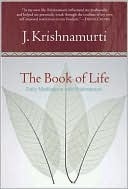More on this book
Community
Kindle Notes & Highlights
Read between
July 11, 2020 - June 21, 2024
is only when you listen without the idea, without thought, that you are directly in contact; and being in contact, you will understand whether what he is saying is true or false; you do not have to discuss.
Therefore, you have not listened. You have responded, you have reacted to a statement, to a fact; therefore, you are not looking at the fact. You are merely translating the fact or giving an opinion about the fact or responding to the fact; therefore, you are not looking at the fact…. If one listens—in the sense without any evaluation, reaction, judgment—surely then, the fact creates that energy which destroys, wipes away, sweeps away ambition which creates conflict.
You know what space is. There is space in this room. The distance between here and your hostel, between the bridge and your home, between this bank of the river and the other—all that is space. Now, is there also space in your mind? Or is it so crowded that there is no space in it at all? If your mind has space, then in that space there is silence—and from that silence everything else comes, for then you can listen, you can pay attention without resistance. That is why it is very important to have space in the mind. If the mind is not overcrowded, not ceaselessly occupied, then it can listen
...more
If you can give full attention without being absorbed in something, and without any sense of exclusion, then you will find out what it is to meditate; because in that attention there is no effort, no division, no struggle, no search for a result. So meditation is a process of freeing the mind from systems, and of giving attention without either being absorbed or making an effort to concentrate.
Concentration is a process of forcing the mind to narrow down to a point, whereas attention is without frontiers. In that process the mind is always limited by a frontier or boundary, but when our concern is to understand the totality of the mind, mere concentration becomes a hindrance.
What happens when the mind forces itself to pay attention? It creates a resistance to prevent other thoughts from seeping in; it is concerned with resistance, with pushing away; therefore it is incapable of attention.
How do you look at a tree? Do you see the whole of the tree? If you don’t see it as a whole, you don’t see the tree at all. You may pass it by and say, “There is a tree, how nice it is!” or say, “It is a mango tree,” or “I do not know what those trees are; they may be tamarind trees.” But when you stand and look—I am talking actually, factually—you never see the totality of it; and if you don’t see the totality of the tree, you do not see the tree. In the same way is awareness.
You do not condemn a bird in flight: you observe it, you see the beauty of it. But, when you consider your own inward strife, you condemn it or justify it. You are incapable of observing this inward conflict without choice or justification.
When revolving at high speed the several blades of a fan appear to be a solid sheet of metal. Our difficulty is to make the mind revolve slowly so that each thought-feeling can be followed and understood. What is deeply and thoroughly understood will not repeat itself.


